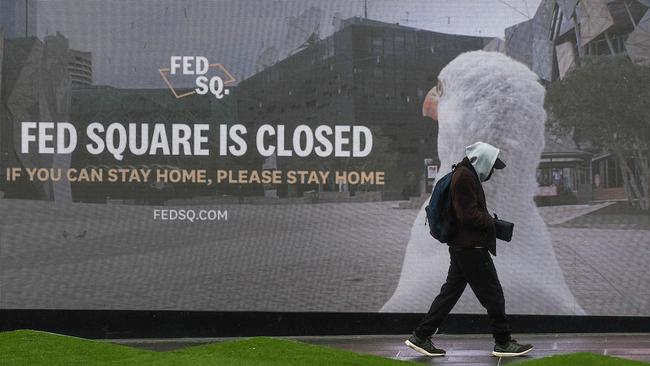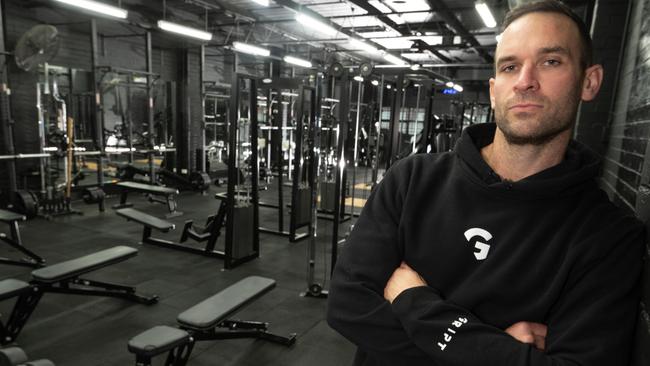A ‘shock’ recession headline will be no surprise to many
National accounts figures next week could show Australia has slipped into its second recession in as many years.

Next week Australians could find themselves waking up to an unexpected headline: the country is already in recession.
Economic activity in the September quarter has been crushed by Delta lockdowns and make a severe contraction a certainty. Looking ahead, the talk and pointed questions from journalists to politicians have all been about whether we’d get another drop in GDP over the final three months of the year.
Maybe they should have been looking backwards.
A growing number of economists are warning Wednesday’s national accounts could show the economy contracted – albeit only slightly – in the June quarter, not least due to some Covid disruptions after a very strong start to the year.
Citi chief economist Josh Williamson, for example, says he now “reluctantly” forecasts GDP to contract by 0.1 per cent.
Which means “Australia is likely to have the headline of going back into a technical recession this year,” Mr Williamson says, with the “technical” definition being two consecutive quarters of contraction.
AMP chief economist Shane Oliver also projects a 0.1 per cent economic contraction in the second quarter, which would mean “the economy will have slipped back into recession” by the end of September.
The consensus view among economists is for small lift in GDP in the second quarter. But plenty of experts are flagging the possibility of a drop, if not outright predicting it.
Bank of America chief economist Tony Morriss says the risk of a technical recession is “relatively high”. NAB has been warning of the risk for a while.
This may all sound a bit strange, but consider that last year’s recession played out in essentially the same way: a lot of bushfires and a bit of Covid sent GDP down 0.3 per cent over the first three months of 2020, before the almighty, record-breaking 7 per cent collapse in the June quarter.
While meeting the technical definition of a recession could come as a shock and trigger some big headlines, it would not come as a huge surprise to the millions of workers and businesses enduring lockdowns.
Indeed, there are parts of the country which have been enduring recessionary conditions constantly since Covid first landed on our shores.
Think shops, cafes, restaurants, gyms and hairdressers in the CBDs of Sydney and Melbourne.
Think those working in and around the international travel and study industries.

So what’s in a name? If the first quarter of last year had been slightly positive instead of negative, would we be calling the 2020 downturn – the largest drop in GDP in 100 years – a recession?
Economists have long derided what they consider the simplistic criterion of two straight quarters of contraction.
Mr Oliver says this recession concept “is less meaningful than usual as it’s not a normal cyclical recession”.
That’s because the artificial, stop-start nature of lockdowns has driven massive dips, followed by equally massive snapbacks that compress the boom-bust cycle from years to mere months.
Even if activity is “a bit constrained” as we learn to live with Covid once stay-at-home orders are lifted, Mr Oliver says “the economy should recover more quickly than would occur after a normal recession as reopening will unleash pent up demand”.
That pent-up demand will be underwritten by the $200bn in excess savings which households will have squirrelled away by the end of the year, CBA head of Australian economics Gareth Aird says.
Indeed, beyond an “adjustment” period, “the future looks very good” for our vaccinated nation next year, and particularly in the second half of 2022 as international borders reopen and businesses’ “animal spirits” return in force, Mr Aird says.
“We are optimistic that by the middle of next year Australians will have adjusted to ‘life with Covid’,” he says.
“Our expectation is that we will have moved to a place that is similar to where the UK is now. Namely that life has returned to normal and we treat Covid in much the same way as we treat other viruses. At that point we think the economy will start to fire on all cylinders.”




To join the conversation, please log in. Don't have an account? Register
Join the conversation, you are commenting as Logout